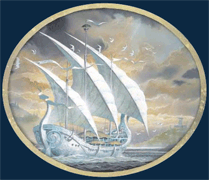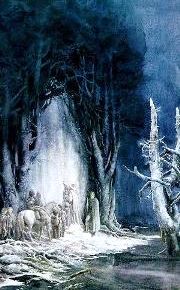Tolkien Calendar: The Great Years
Tolkien Calendar: The Great Years
The Council of Elrond: Tolkien's Literary History
25 October 2005 18:26:46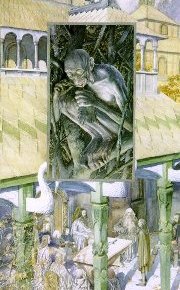
As one can imagine, the chapter The Council of Elrond went through many versions...many revisions. Some major parts and major themes remained virtually intact, while others were altered significantly or eliminated altogether.
* Tolkien knew he would have spill over from the multiple back story parts of the Council, and so created the chapter Many Meetings to deal with several parts of it.
* In the first preliminary writings, the original (now odd sounding names) were still being used for the characters...Trotter...Folco...Old Rory...Peregrin was shortened to Perry, not Pippin...and we stilled had Bingo...Odo...Faramond...Burin...and more.
* Here also, at last, Tolkien begins to decide that the character of Trotter (who the Hobbits met at Bree and guides them to Rivendell), can no longer be a Hobbit himself. This was "where the idea that the Rangers were Men, 'the last remnant of the kingly people from beyond the Seas' first emerged." But this was a long time coming and for many edits Trotter remained Peregrin Boffin.
* It is also during the writing and revisions to this chapter that Tolkien made a decision about the Rings of Power. Originally Tolkien wrote that during the Council the Three were indeed made by Sauron and they gave the Elves great power. If was only later in the writing that Tolkien decided that Celebrimbor should have made the Three, and Sauron made the One Ring in answer to them. "This is the first appearance of this central idea concerning the origin and nature of the Rings:".
* Tolkien, as can be expected, struggled mightily with the make-up of the Fellowship. Many, many versions emerged...the first being Gandalf, Trotter, Frodo, Sam, Merry, Folco, Odo, Glorfindel, and Burin (son of Balin). It is odd to think that this first group contained no Men.
Glorfindel becomes Legolas. Burin becomes Gloin. Odo is finally eliminated from the tale altogether. Folco becomes Pippin. Boromir is added to the Fellowship. But...probably the most significant transformation is that of Trotter.
In Christopher Tolkien's words...
" 'Trotter would also be useful' was changed to 'Trotter will also be essential'; and probably at the same time my father wrote in the margin: 'Trotter is connected to the Ring.' This alteration thus comes from somewhat later, when he was reaching the conception of Aragorn and his ancestry. Trotter was of course still a hobbit. In the margin my father wrote against this passage: 'Correct this. Only Trotter is of ancient race' (i.e. Trotter is a Númenorean, but Boromir is not)."
Gotta LOVE that Tolkien!
Artwork: "The Council of Elrond" by Alan Lee
© The Tolkien Estate. Images © Alan Lee.
December 25, TA 3018
25 December 2005 22:06:34The Company of the Ring leaves Rivendell at dusk.
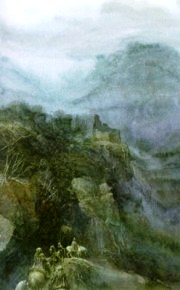
It is hard not to use Tolkien's own poignant words for this date. December 25, TA 3018, is a date full of hope and yet full of dread for the new Company...the Fellowship of the Ring. It is to be remembered that they had decided to travel only at night to avoid detection by the Enemy.
They were setting out on the quest to destroy the Ring. In all of the history of Middle-earth, there is perhaps no more meaningful date. Gone were the carefree days in the Shire. All in the Fellowship were aware of the overwhelming sense of purpose.
Quote:
Their farewells had been said in the great hall by the fire, and they were only waiting now for Gandalf, who had not yet come out of the house. A gleam of firelight came from the open doors, and the soft lights were glowing in many windows. Bilbo huddled in a cloak stood silent on the doorstep beside Frodo. Aragorn sat with his head bowed to his knees; only Elrond knew fully what this hour meant to him. The others could be seen as grey shapes in the darkness.
Sam was standing by the pony, sucking his teeth, and staring moodily into the gloom where the river roared stonily below; his desire for adventure was at its lowest ebb.
Sam was standing by the pony, sucking his teeth, and staring moodily into the gloom where the river roared stonily below; his desire for adventure was at its lowest ebb.
Images © "Fellowship Journey" by Alan Lee.
January 8, TA 3018
8 January 2006 14:26:34The Fellowship reaches Hollin
In my mind, Hollin has always been a lovely place, even in its abandonment. I have images of the wild holly trees growing there, sheltering birds behind their dark thorny leaves and feeding them with their cheery red berries. In its day Hollin (Erigion in the elven tongue) shone with the glory of the Noldor. Celebrimbor and his elves came there in 750SA, (second age) drawn by the find of Mithril in Moria. These Elves formed an alliance with the Dwarves of Moria together forging many fair things. It was here, in Hollin, that the Great Rings were forged - rings that nearly matched the craftsmanship of the Similrilli.
Hollin flourished for 950 years until Sauron, in his rage that the Elves would refuse to use The Three - choosing instead to hide them, destroyed it. From this time forward it remained a wild place where the birds and the beasts lived and through which a few strange folk, such as rangers, would pass. But, no people ever settled Hollin again.
From Rivendell, it takes the Fellowship a fortnight, traveling by night 232 miles over rough terrain, to reach the borders of Hollin. Topping the ridge that is the northern border of Hollin, the company basks in the change of weather. The wind, which has been out of the north, shifts around to come from the south and the sun, which had been hidden by clouds all this time, makes a pale appearance. To the east lie the peaks that cover Moria. Gandalf informs the fellowship that they will rest here for the day and the night for, he says, Hollin is a wholesome place. No place where the elves have lived ever completely forgets them. True, but says Legolas; "...the trees and the grass do not remember them. Only I hear the stones lament them: 'deep they delved us, fair they wrought us, high they builded us; but they are gone.' They are gone. They sought the Havens long ago."
The company makes a hopeful breakfast even allowing themselves a fire in a hollow beneath the Holly. They linger and take their ease bantering with a restless and troubled Aragorn who has observed that the only signs of life in the valley are the fellowship themselves. Eventually the company settles to sleep leaving Sam the first watch. He is joined by a sleepless Aragorn.
In the end, the hoped for overnight rest was not to be. During the first watch, large flocks of birds are seen flying low over the valleys and ridges looking as though they are spying out the land. Aragorn wakes Gandalf to tell him about the cerbain and inform him that they must leave that night. "Hollin is no longer wholesome for us." The company remains in hiding the remainder of the day watching as the dark birds occasionally pass over.
At dusk they set out, steering their course towards Caradhras. The moon is full and they pass, along the main road, through the tumbled ruins of the stones wrought by the elves so many years before. In the early hours of morning but still before the dawn, a shadow, that makes Frodo shiver, passes swiftly over the stars. At Frodo's question, Gandalf says that he felt rather than saw something, perhaps he suggests, it was just a wisp of a cloud. "It was moving fast then," muttered Aragorn, "and not with the wind."
Hollin flourished for 950 years until Sauron, in his rage that the Elves would refuse to use The Three - choosing instead to hide them, destroyed it. From this time forward it remained a wild place where the birds and the beasts lived and through which a few strange folk, such as rangers, would pass. But, no people ever settled Hollin again.
From Rivendell, it takes the Fellowship a fortnight, traveling by night 232 miles over rough terrain, to reach the borders of Hollin. Topping the ridge that is the northern border of Hollin, the company basks in the change of weather. The wind, which has been out of the north, shifts around to come from the south and the sun, which had been hidden by clouds all this time, makes a pale appearance. To the east lie the peaks that cover Moria. Gandalf informs the fellowship that they will rest here for the day and the night for, he says, Hollin is a wholesome place. No place where the elves have lived ever completely forgets them. True, but says Legolas; "...the trees and the grass do not remember them. Only I hear the stones lament them: 'deep they delved us, fair they wrought us, high they builded us; but they are gone.' They are gone. They sought the Havens long ago."
The company makes a hopeful breakfast even allowing themselves a fire in a hollow beneath the Holly. They linger and take their ease bantering with a restless and troubled Aragorn who has observed that the only signs of life in the valley are the fellowship themselves. Eventually the company settles to sleep leaving Sam the first watch. He is joined by a sleepless Aragorn.
In the end, the hoped for overnight rest was not to be. During the first watch, large flocks of birds are seen flying low over the valleys and ridges looking as though they are spying out the land. Aragorn wakes Gandalf to tell him about the cerbain and inform him that they must leave that night. "Hollin is no longer wholesome for us." The company remains in hiding the remainder of the day watching as the dark birds occasionally pass over.
At dusk they set out, steering their course towards Caradhras. The moon is full and they pass, along the main road, through the tumbled ruins of the stones wrought by the elves so many years before. In the early hours of morning but still before the dawn, a shadow, that makes Frodo shiver, passes swiftly over the stars. At Frodo's question, Gandalf says that he felt rather than saw something, perhaps he suggests, it was just a wisp of a cloud. "It was moving fast then," muttered Aragorn, "and not with the wind."
January 13, TA 3019
13 January 2006 20:32:29The Fellowship enters Moria
In what must surely be one of the longest and most exhausting days of their journey, the Fellowship battles Wargs at the foot of Caradhras, makes a desperate run for the dubious sanctuary of Moria, and by the end of the day discovers that Gollum has followed them into the Mines to pursue the Ring. If the Nine Walkers (and some readers) had thought the Quest rather dull to this point, here Tolkien jolts them out of any complacency or perception of tedium.
After the disastrous attempt at Caradhras, the Fellowship debates the merits of Gandalf's plan to enter Moria in an attempt both to shorten the journey and hide from their enemies. They decide to sleep on the question, but the night is interrupted by a running battle with howling Wargs, and the promise of one even worse with orcs yet to come. Desperation leaves the group without a choice; they must make a dash for Moria, arriving at the Doors of Durin just in time to see moonlight and starlight reveal the Ithil letters proclaiming "Speak Friend and Enter."
In one of the story's few comic moments, Gandalf cannot get the doors to open no matter what spell or translation he uses, and in frustration bangs his staff on them. Meanwhile, the others unload Bill the Pony, who to Sam's heartbreak must be turned loose, for he cannot enter the Mine. Ripples in the foul lake just outside the Doors bespeak an ominous presence, which Boromir disturbs by throwing rocks into the water.
Then, as Tolkien says, "Several things happened at once." Gandalf solves the simple riddle and utters "Mellon," Elvish for friend, and the Doors open just as the Watcher in Water extends its tentacles in an attempt to catch the Company, Frodo first of all. Bill the Pony flees in abject terror, beginning his long journey back to Bree. The others rush inside Moria to escape, and the Watcher brings down the Doors and the lovely holly trees which flanked them. Now the Fellowship has no choice but to march through the long dark of Moria.
As if that were not daunting enough, soon Frodo becomes aware of soft padding feet following behind the Company. He suspects what Gandalf and Aragorn know--that Gollum is following the Walkers. This episode marks his first appearance in real-time in the story--up to this point he has only been shown to the reader in history.
The Fellowship moves through the dark corridors of the dwarven halls, bringing Pippin ever closer to a certain well. . . .
After the disastrous attempt at Caradhras, the Fellowship debates the merits of Gandalf's plan to enter Moria in an attempt both to shorten the journey and hide from their enemies. They decide to sleep on the question, but the night is interrupted by a running battle with howling Wargs, and the promise of one even worse with orcs yet to come. Desperation leaves the group without a choice; they must make a dash for Moria, arriving at the Doors of Durin just in time to see moonlight and starlight reveal the Ithil letters proclaiming "Speak Friend and Enter."
In one of the story's few comic moments, Gandalf cannot get the doors to open no matter what spell or translation he uses, and in frustration bangs his staff on them. Meanwhile, the others unload Bill the Pony, who to Sam's heartbreak must be turned loose, for he cannot enter the Mine. Ripples in the foul lake just outside the Doors bespeak an ominous presence, which Boromir disturbs by throwing rocks into the water.
Then, as Tolkien says, "Several things happened at once." Gandalf solves the simple riddle and utters "Mellon," Elvish for friend, and the Doors open just as the Watcher in Water extends its tentacles in an attempt to catch the Company, Frodo first of all. Bill the Pony flees in abject terror, beginning his long journey back to Bree. The others rush inside Moria to escape, and the Watcher brings down the Doors and the lovely holly trees which flanked them. Now the Fellowship has no choice but to march through the long dark of Moria.
As if that were not daunting enough, soon Frodo becomes aware of soft padding feet following behind the Company. He suspects what Gandalf and Aragorn know--that Gollum is following the Walkers. This episode marks his first appearance in real-time in the story--up to this point he has only been shown to the reader in history.
The Fellowship moves through the dark corridors of the dwarven halls, bringing Pippin ever closer to a certain well. . . .
Calendar entry by Librislove
January 14, TA 3019
15 January 2006 16:55:46Night in Hall Twenty-one.
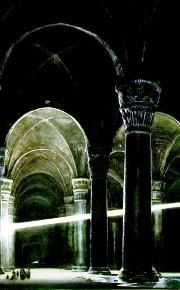
As I read The Lord of the Rings for the first time I was so captivated by the happenings leading up to Rivendell, and then the Council, that I found it difficult to get back into the story...until Moria. Here Tolkien's magic caught me up again and I was fascinated and terrified by the great dark caverns and the terror that was hinted at within.
Quote:
"The Company spent that night in the great cavernous hall, huddled close together in a corner to escape the draught: there seemed ti be a steady inflow of chill air through the eastern archway. All about them lay as they lay hung the darkness, hollow and immense, and they were oppressed by the loneliness and vastness of the dolven halls and endlessly branching stairs and passage. The wildest imaginings that dark rumour had ever suggested to the hobbits fell altogether short of the actual dread and wonder of Moria."
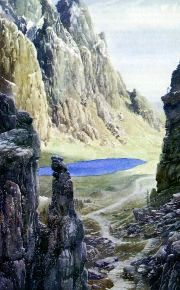
But the most remarkable passage from this part of the book...from this dark night in Moria, is the chant of Gimli. In an effort not to steal the thunder of the Shire Poets, I give you here a mere smattering of the verse...and the magic of Moria.
The forge's fire is ashen cold;
No harp is wrung, no hammer falls:
The darkness dwells in Durin's halls;
The shadow lies upon his tomb
In Moria, in Khazad-dum.
But still the sunken stars appear
In dark and windless Mirrormere;
There lies his crown in water deep,
Till Durin wakes again from sleep."
Images © "In the Halls of Moria" & "Mirrormere" by Alan Lee.
Last edited: 3 July 2022 14:29:05
